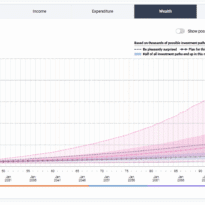Paul Hanlon is drawing on his 19 years’ experience of financial services to launch a new outsourced paraplanning service based on flexibility and a deep integration with advice firm clients. He spoke to PP editor Rob Kingsbury about the new firm and his plans for the future.
Paul Hanlon has spent nearly 20 years in financial services and now he feels is the right time to launch his own outsourced planning business.
Paul started working in financial services in 2006 as part-time Saturday worker while still at school. He had stints with Lloyds Bank and Wesleyan, before joining advice firms like Charles Stanley, becoming a paraplanner in 2014 and being promoted to paraplanning manager in 2020. He then moved to become head of technical at MKC Wealth in 2023, where he led a team of 19 paraplanners.
This year, he decided it was time to step outside of employed work to set up his own outsourced paraplanning business and launched WePlan Paraplanning in March 2025. “I like managing and mentoring people, but since my first taste of paraplanning at Charles Stanley and seeing how it can positively affect people’s lives, I felt it was time to get back to being a hands-on paraplanner again, helping people within my own business.”
In the ever more competitive outsourced market, Paul says he believes there is always a place for quality paraplanning.
“I think there’s a lot of opportunity out there to provide good paraplanning support. There is a difference between paraplanning and report writing, and through the shift towards holistic financial planning, the need for strong paraplanners is greater than ever. Making sure you’ve got the qualifications is obviously a good start, but having the experience of dealing with lots of types of advice and to work comfortably with the different ways advisers operate; I think that’s super important.
“Having worked with outsourced paraplanners in the past, I felt there can sometimes be a gap between the paraplanning support and the advisers. We want to bridge that gap and provide a level of support that remains personal so that advisers feel we are part of their existing team. We’ll use their firm’s templates, systems and tools so that we’re operating on their terms, integrating with them and being seen as an extension of their team rather than a bolt on support. We can be as flexible as the business wants us to be; that way, I feel we can work best with the advisers and deliver the best outcomes for the clients.”
While leaving employed work and starting from scratch was a leap of faith, Paul says, his time in the market and his connections quickly saw him approached by people he knew looking to work with him. “Some of the people I am working with go back 10 years or so and I think that’s testament to the quality of the work we can provide.
“It shows the importance of building good working relationships, because you just don’t know what’s coming down the line and where opportunities may take you.”
Firms that Paul thinks WePlan can work with in particular are those looking to grow but who don’t want to employ staff at this time. “Using us as paraplanning support means we work closely with them without the high overhead costs that come with employed staff such as cost of premises, national insurance, pensions payment, employee benefits and so on.
“We’ve been speaking to firms who are actively growing, acquiring businesses or are being brought together by private equity, where we feel we can add value for them as the needs of the businesses change.
“We’re also looking at firms who simply want to build lasting relationships with a quality outsourced paraplanning firm, so we can really get to know them and work in the way that they want.
“Ideally, we’re looking to work with firms long term, with the potential to help see their clients through their financial planning journey over five or more years.”
Setting up the business was “a bit of a baptism of fire”, Paul says. “I’m very comfortable with the paraplanning side, but the business of finding clients, creating a website, getting the branding right and marketing, are all areas I’ve not had to deal with before. It’s all new to me but I’m enjoying every step.”
The firm currently charges an hourly rate. “I feel that an hourly rate basis is better for the clients that I work with because if I’m more efficient they feel the benefit of that,” Paul says.
Paul believes paraplanners need to embrace AI. “They say AI won’t take your job but another firm using AI will.
“I’ve seen different tools being used in areas such as fact finds, meeting notes and suitability reports. They can really deal with these quickly and efficiently and from a paraplanner’s point of view, having transcript notes of client meetings with all the soft facts included can really help speed up the process.
“Importantly, it can help paraplanners focus on the areas where we truly add value, such as critical thinking, personalisation and challenging where we think it’s needed.”
Looking ahead, with a three to five year view, Paul says he wants to grow the business to have a small team of paraplanners delivering quality paraplanning and a personal service for the advice firms they work with. Also, to bring in new talent to the profession, mentoring and training people who want to make paraplanning their career. “At this early stage I don’t want to put numbers on it but I know that’s where we are heading,” he says.
Main image: waro-photos-c6r_ihkj6vI-unsplash































